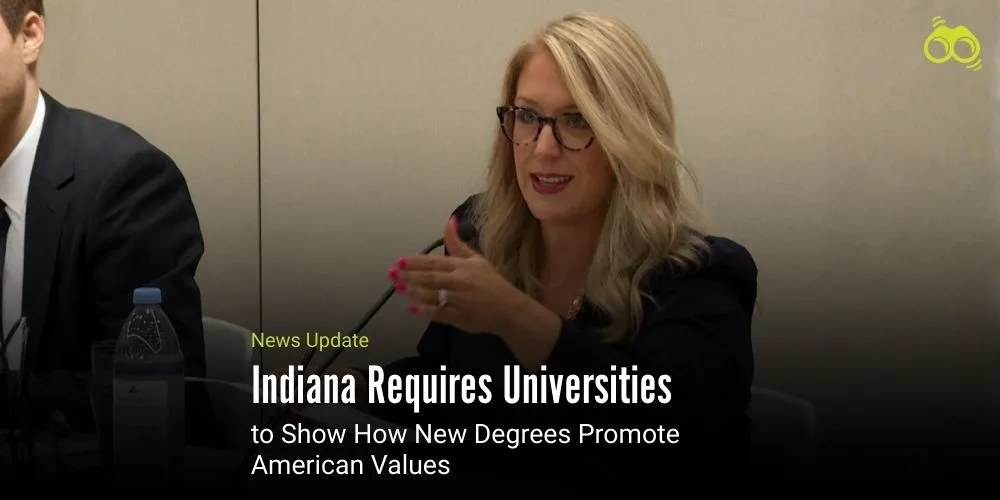New rule in Indiana links degree approval to core values of American society
Indiana Commission for Higher Education adds civic engagement requirement to degree proposals
A fresh mandate from Indiana's Commission for Higher Education now entails that public universities seeking approval for new degree programmes append an explanation of how their courses will foster civic responsibility and the core values of America. This updated proposal form, announced in the commission's meeting of 13 November, includes inquiries on how the curricula adopt components for civic engagement and the obligations of citizenship in a free society.
All these reforms came after the state had scrapped thousands of degrees with very few graduates, compelling colleges to consolidate programmes that now must obtain approval from the commission under the new rules. They follow the references to "Compact for Academic Excellence in Higher Education" by President Trump, promising preferential federal funding to universities agreeing to specific policy priorities. No Indiana institution has yet been offered the compact, but the directive aligns with broader national debates on the role of higher education in developing civic values.
Faculty leaders have raised alarm over the requirement because it exposes academic freedom to potential ideological criteria in programme adoption. They argue that universities should develop their curricula on their own without having to frame them around political priorities. For others, however, the provision could be beneficial in strengthening civic education and getting graduates better prepared to engage actively as citizens. The real practical aspect concerns the universities themselves.
Academic teams will have to integrate civic engagement into new degrees, such as service learning, constitutional studies, or community partnerships, along with recording these elements clearly, mapping learning outcomes to civic competencies, and providing evidence of impact. Proposals that do not seem to show this alignment, however, might meet delays or even rejection during review.
This directive adds another pressure point on institutions struggling with programme consolidation and financial challenges. It raises important questions regarding how "core values" will be interpreted among reviewers and whether such requirements will spur or stifle the innovation of civic learning. A change for Indiana, this depicts a shift in how degree approvals would be framed. More or less all these new arrangements force universities into the formalised embedding of civic competencies in curricula, thus balancing the need to comply and the freedom of academic curricula. Long-term ramifications are going to depend on how the commission applies the requirement, whether it widens civic education or narrows down the diversity of the programmes.
Editor's Note:
Indiana's higher education landscape has undergone a notable shift, according to this report. The Commission for Higher Education now mandates that universities must illustrate how any proposed new degree programmes will foster civic responsibility and uphold American societal values. This requirement was established following the elimination of several public university degrees with low enrolment, mirroring broader national discussions regarding the role of universities in influencing and shaping civic life. Proponents feel this might strengthen civic education and prepare graduates to participate more effectively in society. In contrast, faculty heads worry that it mandates political criteria into curriculum design within higher education and could therefore delimit academic freedom. For universities, it means added effort in planning and documenting how these courses stimulate civic engagement. It leaves open further questions concerning definitions of "core values" and perhaps whether the requirement will encourage innovation or restrict diversity in programmes. The consequence is a reframing of degree approvals within Indiana. The long-term effects, however, hinge on the commission's execution of the regulation and whether it successfully promotes greater accessibility to civic education while preserving the continuous independence of academic institutions.
As per Skoobuzz, Indiana’s new directive marks a clear shift in how degree approvals are handled. Universities must now embed civic responsibility into curricula, balancing compliance with academic freedom. The long‑term impact will depend on how the commission enforces these rules and whether they broaden civic education or restrict programme diversity.
Frequently Asked Questions
1. Why does Indiana want universities to promote American values in new degrees?
Indiana’s Commission for Higher Education has added this requirement to ensure that new degree programmes prepare students not only for careers but also for active citizenship. The state believes universities should help graduates understand civic responsibility and the values that underpin a free society.
2. What are the “core values of American society” according to Indiana’s higher education commission?
The commission has not listed a fixed set of values, but its proposal form refers to civic responsibility, civic engagement, and the duties of citizenship. Universities are expected to show how their courses encourage these principles in practical and measurable ways.
3. Do all new degree programmes in Indiana need state approval now?
Yes. Any new degree offered by a public college or university in Indiana must be approved by the Commission for Higher Education. The updated proposal form, which now includes the civic‑values question, is part of this approval process.
4. How will universities show that their curriculum fosters civic engagement?
Universities will need to include clear evidence in their proposals. This may involve service‑learning modules, constitutional studies, community partnerships, or other activities that link academic learning to civic outcomes. They must also map learning outcomes to civic competencies and provide documentation of impact.
5. What happens if a proposed degree does not meet Indiana’s value criteria?
If a proposal does not demonstrate how it fosters civic responsibility and American values, it may face delays or rejection during the commission’s review. Universities will then have to revise their programmes to meet the requirements before approval can be granted.














0 Comments (Please Login To Continue)